

Yuriy Román
Robert T. Haslam (1911) Professor of Chemical Engineering
Principal Investigator
yroman@mit.edu | ChemE Faculty Page
Office: 66-558b
Phone: 617-253-7090
Professor Yuriy Román is from Mexico City, Mexico. He earned his B.S.E. in Chemical Engineering from the University of Pennsylvania in 2002. After working in industry for a year, Prof. Román moved to Madison, WI to pursue graduate studies. He received his Ph.D. in Chemical and Biological Engineering from the University of Wisconsin-Madison in 2008, working under the supervision of Professor James A. Dumesic. His thesis work involved the catalytic conversion of carbohydrates obtained from lignocellulosic biomass into chemical intermediates used for the production of biofuels and biomaterials. He then moved to the California Institute of Technology to do postdoctoral research in the synthesis and characterization of microporous and mesoporous materials in the group of Professor Mark E. Davis. There, he investigated the synthesis and implementation of microporous Lewis and Brønsted solid acids for the isomerization of carbohydrates and production of acetic acid from methanol.

2010 - present

Ran Zhu
Postdoc
ranzhu@mit.edu
Office: 66-008
Phone: 617-253-0848
Ran received his B.S. in Chemistry and Mathematics from Iowa State University in 2013, where he studied quantum dot synthesis under the supervision of Prof. Javier Vela and synthesis and characterization of new complex intermetallic structures under the supervision of Dr. Qisheng Lin and Prof. Gordon Miller. He obtained his M.S. in Material Science and Engineering from the University of Pennsylvania in 2014. At UPenn, he researched the dual-phase membrane for syngas production in Prof. Raymond Gorte's group. He received his Ph.D. in Chemical Engineering from Syracuse University under the guidance of Prof. Jesse Bond in 2020. His Ph.D. thesis focuses on the oxidative C-C scission of levulinic acid and methyl ketones over supported vanadium oxide catalysts. Ran joined the Román lab in October 2020 to research kinetics and catalyst engineering in heterogeneous olefin metathesis over supported tungsten oxide and molybdenum oxide.
2010 - present
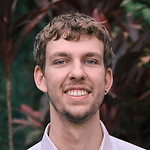
Max Hülsey
Postdoc
mhuelsey@mit.edu
Office: 66-008
Phone: 617-253-0848
Max received his B.S. degree in Biochemistry at Heidelberg University conducting research on metal-organic DNA intercalation complexes in the Kulak group. During his master’s degree in Chemistry at Heidelberg University, he joined the Román group working on converting and upgrading lignin biomass on catalytic surfaces. He then joined the National University of Singapore for his Ph.D. in the Yan group focusing on the spectroscopic and spectrometric study as well as catalytic applications of model single atom catalysts. During his Ph.D, he also developed dynamic promotion methods for catalytic reactions under oscillating potentials. He currently is a Schmidt Science Postdoctoral Fellow co-supervised between the Surendranath and the Román labs working at the interface of thermal and electrocatalysis.

Mostapha Dakhchoune
Postdoc
mdakhcho@mit.edu
Office: 66-008
Phone: 617-253-0848
Mostapha received his B.Sc. in Environmental Engineering from the University of Florence, Italy, in 2013. He then moved to Bologna (Italy) to pursue his M.Sc. in Chemical Engineering at the Alma Mater University of Bologna. Mostapha did his PhD at the École Polytechnique Fédérale de Lausanne (EPFL, Switzerland) under the supervision of Prof. Kumar Varoon Agrawal where he worked on the development of two-dimensional inorganic membranes for gas separation. He spent one year in Zurich (Switzerland) working in the R&D department of a startup that aimed at separating propane/propylene mixtures with MOF membranes. Mostapha joined the Román Group as a Schmidt Science Fellow on October 2022, where he is currently focusing on the electric field promotion of catalysis and solvation effect under two-dimensional materials.

Xianyuan "Andy" Wu
Postdoc
wuandy@mit.edu
Office: 66-008
Phone: 617-253-0848
Xianyuan Wu was born in Anhui, China. He received his bachelor’s degree in 2010 from Huaibei Normal University. Then he moved to Zhejiang University of Technology to pursue his Master degree, with the research focusing on the continuous upgrading of ethanol to butanol over supported metal catalysts. In 2015, he worked as a PhD candidate under the direction of Prof. Katalin Barta at the University of Groningen, with the research topic of catalytic transformation of biomass waste into well-defined chemicals and polymeric materials. After that, he moved to University of Graz as a visiting student with a specialization of closed-loop recycling of biobased thermosets. Now, he is working as post-doc researcher in Prof. Román’s group and his current research focuses on catalytic plastic upcycling and biomass upgrading.

Bowei Liu
Postdoc
boweiliu@mit.edu
Office: 66-008
Phone: 617-253-0848
Bowei is originally from Bengbu, China. He received his B.S. in Chemistry from the University of San Francisco in 2015. He then moved to Syracuse University for pursuing graduate studies and received his M.S. in 2019 and Ph.D. in 2023 under the mentorship of Professor Jesse Bond. Through the graduate period, he has worked on mechanistic studies of methyl ketone oxidation over supported vanadium oxides for biomass upgrading, and the exploration of hydrothermal gasification reactions in production of renewable natural gas for harvesting energy from sewage sludge. Bowei's current research will pursue developing high performance PHA plastics from biomass-derived lactones.
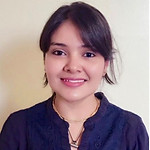
Rachita Rana
Postdoc
rrana@mit.edu
Office: 66-008
Phone: 617-253-0848
Rachita is from India, where she earned her bachelor's degree in chemical engineering from Banasthali University. She then moved to Canada, pursuing her M.Sc. at the University of Saskatchewan, where she worked on catalyst design for gas oil hydrotreating and conducted experiments at the Canadian Light Source. Subsequently, Rachita moved to the United States for her Ph.D. in chemical engineering at UC Davis. Supervised by Professors Kulkarni (UCD) and Simon Bare (SLAC), her project involved both computational and experimental catalysis. In addition to DFT calculations, her research included atomically dispersed catalyst synthesis in the Gates Lab at UC Davis and beamline experiments at SSRL. Primarily, her Ph.D. work involved developing QuantEXAFS. Later, she interned at Stanford in the Cargnello group and at SLAC, focusing on experimental testing of catalysts for propene epoxidation. In January 2024, Rachita joined the Román Group, where she is working on device fabrication and testing, with a particular emphasis on exploring the electric field promotion of catalysis.

Kaylee McCormack
Ph.D. Student
Office: 66-019
Phone: 617-253-7982
Kaylee was raised in upstate New York and east Central Florida. She obtained her B.S. in Chemical Engineering from Auburn University in May 2017, where her research was in organic chemistry, working on the development of photoresists that degrade completely to gaseous materials. She then performed research at the Technical University of Denmark in Kongens Lyngby, Denmark as part of a Fulbright grant from Fall of 2017 to the Summer of 2018. There her thesis focused on the deactivation of the industrial catalyst used for methanol to formaldehyde oxidation through experimental and mathematical modeling. After completing the Fulbright grant, she moved to Boston, MA to pursue graduate studies at MIT. Her current research focuses on the development and characterization of novel core-shell electrocatalysts that have enhanced stability under ORR conditions compared to traditional catalysts.
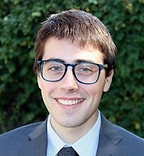
Griffin Drake
Ph.D. Student
Office: 66-019
Phone: 617-253-7982
Griffin Drake is from Portland, OR, and received his B.S. in chemical engineering from Oregon State University in 2019. His previous research work is primarily focused on solar thermochemical energy storage, working with Professor Nick AuYeung, but he has also worked on esterification kinetics (Professor Thomas Schwartz, U. Maine) and methanol electrooxidation (Professor Adam Holewinski, CU Boulder). He enjoys drawing. His current research focuses on plastic depolymerization and upcycling.
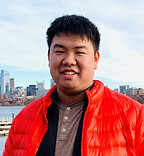
Daniel Zheng
Ph.D. Student
Office: 66-008
Phone: 617-253-0848
Daniel received his B.S. in Materials Science and Engineering from Cornell University in 2019. As an undergraduate, he studied ion exchange of transition metal oxide nanoparticles for use as supercapacitor electrodes and electrocatalysts with Professor Richard Robinson. He also spent a summer at Pacific Northwest National Lab with Dr. Jason Zhang developing a solvent-free fabrication method for free-standing Li-S battery cathodes. As a co-advised student in the Román and Shao-Horn groups, Daniel is working on methanol oxidation and direct methanol fuel cells.
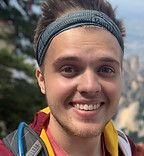
Blake Johnson
Ph.D. Student
Office: 66-019
Phone: 617-253-7982
Blake grew up in Bloomington, MN and received Bachelor’s degrees in Chemical Engineering (B.Ch.E.) and Chemistry (B.S.) from the University of Minnesota in 2019. As an undergraduate researcher, Blake worked with Professor Aditya Bhan to elucidate the mechanism of methylbenzene dealkylation in solid-acid catalysts during methanol-to-olefins catalysis. Following this project, Blake developed methods to assess catalyst deactivation in terms of site-loss rate, selectivity, and yield. Blake’s current work at MIT focuses on the non-Faradaic promotion of catalysis.

Husain Adamji
Ph.D. Student
Office: 66-008
Phone: 617-253-7982
Husain grew up in Dar es Salaam, Tanzania. He received a B.S. in Chemical Engineering from Tufts University in May 2020. As an undergraduate, Husain performed research in Professor Prashant Deshlahra’s group where he studied structure-property relations in next-generation Group III-V semiconductors like GaAsBi using Density Functional Theory (DFT). Following this project, Husain also worked with Professor Deshlahra on the selective oxidative dehydrogenation of propane using nitric oxide as a homogeneous gas-phase catalyst. At MIT, Husain is a co-advised student in the Roman and Kulik groups, and is working on novel inorganic porous catalyst design inspired by biological enzymes.

Bhavish Dinakar
Ph.D. Student
Office: 66-019
Phone: 617-253-7982
Bhavish graduated from the University of California – Berkeley in 2020 with a B.S. in Chemical Engineering. His undergraduate research primarily focused on developing materials for carbon capture (Professors Jeff Long and Jeff Reimer), and he has also worked on isotopic composition measurements of nitrous oxide (Professor Kristie Boering) and catalysis with nanoparticles encapsulated in porous organic frameworks (Professor Matteo Cargnello, Stanford University). As a co-advised student in the Román and Dincă groups, his current work focuses on catalysis in conductive metal–organic frameworks.
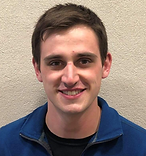
Matthew Webber
Ph.D. Student
Office: 66-021
Phone: 617-253-7982
Matt grew up in Sanford, ME and received his B.S. in Chemical Engineering from the University of Maine in 2020. As an undergrad, he conducted research with Prof. Thomas Schwartz into the catalytic etherification of biomass derivatives over zeolites as well as the hydrogenation of amino acids to their corresponding alcohols. He also worked with Prof. Howard Patterson to investigate the vapochromic response of transition metal iodides when exposed to volatile organic compounds. Matt’s current research is focused on the catalytic upgrading of lignin.

Anna Brenner
Ph.D. Student
Office: 66-021
Phone: 617-253-7982
Anna graduated from the University of Kansas in 2021 with a B.S. in Chemical Engineering. Her undergraduate research with Dr. Mark Shiflett focused on developing an alternative treatment for hemochromatosis using advanced materials such as zeolites, hydrotalcites, clays, tannins, and hops. During her time at KU, she was awarded the NOAA Hollings Scholarship where she interned for the NOAA Chemical Sciences Laboratory and studied the effect of consumer volatile chemical products on ozone pollution in New York City. At MIT, Anna is currently working on catalytic strategies for plastic waste rehabilitation.
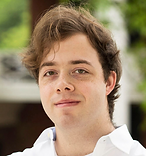
Karl Westendorff
Ph.D. Student
Office: 66-021
Phone: 617-253-7982
Karl received his B.S. in Chemical Engineering from the University of Virginia in 2021, where he conducted research under Profs. Gaurav Giri, Dean Harman, and Chris Paolucci. With Prof. Giri, Karl investigated metal organic frameworks and their ability to separate CO2/CH4 mixtures. Additionally, Karl researched methods to control MOF polymorphism. In the Harman Lab, Karl investigated Mo and W-based dearomatization complexes with applications in pharmaceutical development and used computational techniques to understand these complexes’ reactivity. Karl’s computational work with Prof. Paolucci studied Pd speciation in SSZ-13 zeolites to aid in their potential use as passive NOx adsorbers. Now co-advised between the Román and Surendranath groups, Karl investigates the electric fields present at heterogeneous interfaces and their effects on catalysis.

Katie Groenhout
Ph.D. Student
Office: 66-021
Phone: 617-253-7982
Katie graduated with a B.S. in Chemical and Biomolecular Engineering from Georgia Tech in 2022. In her undergraduate research, she worked on anion exchange membrane electrolyzers under Prof. Paul Kohl. Additionally, she worked with Prof. Nian Liu on lithium-ion batteries, and she spent a summer with Prof. Jared Delcamp at the University of Mississippi researching dye-sensitized solar cells. In the Román group, Katie will work on non-faradaic promotion and plastics.
Melissa Manetsch
Ph.D. Student
Office: 66-021
Phone: 617-253-7982
Melissa obtained her B.S. in Chemical Engineering from the University of Illinois, Urbana-Champaign in 2022. At UIUC she worked in the Flaherty group where she studied active site requirements for direct ester hydrogenation. She also worked with Dr. Vanda Glezakou at Pacific Northwest National lab, where she generated DFT data and built an ML model to determine the optimal amine solvent/diene pair for carbon dioxide capture. In January 2023, Melissa joined the Kulik and Román groups as a Ph.D. student in Chemical Engineering. Now, Melissa seeks to quantify the role of electric fields in heterogeneous catalysts with spectroscopy techniques and polarizable molecular models.
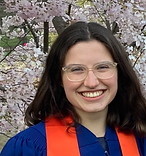
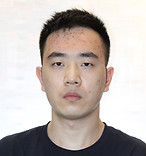
Xiao Wang
Ph.D. Student
Office: 66-021
Phone: 617-253-7982
Xiao is originally from China. He received his B.S. in Chemical Engineering from McGill University in 2022. He performed DFT studies under the guidance of Prof. Ali Seifitokaldani, where he investigated the reaction mechanisms for reactions including OER and glucose oxidation. He also worked as an undergraduate research assistant in the Sargent group at the University of Toronto, where he worked on electrocatalytic carbon dioxide and carbon monoxide reduction reactions. As a Ph.D. student in both Prof. Yuriy Roman's and Prof. Yang Shao-Horn's groups, his current research focuses on coupling thermo- and electrocatalysis for plastic upcycling and nitrogen activation. In his spare time, he enjoys listening to music and cooking.

Juliana Lu-Yang
Ph.D. Student
Office: 66-021
Phone: 617-253-7982
Juliana graduated with a B.S. in Chemical Engineering and an M.S. in Mechanical Engineering from Stanford University in 2023. At Stanford, Juliana studied redox-active polymers for electrochemical energy storage under Professor Zhenan Bao and liquid crystal elastomer actuators for soft robotic systems under Professor Renee Zhao. Juliana previously also worked at Tesla to design and synthesize energy dense ceramic oxides for use in commercial electric vehicle battery cathodes. In the Román group, Juliana is working on catalytic strategies for plastics deconstruction and upcycling.